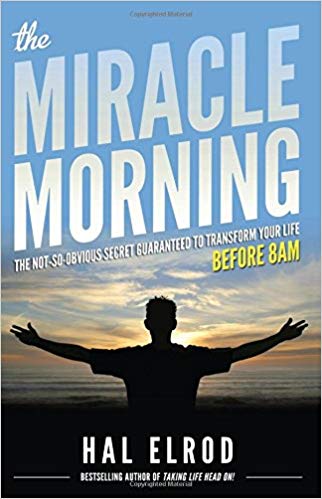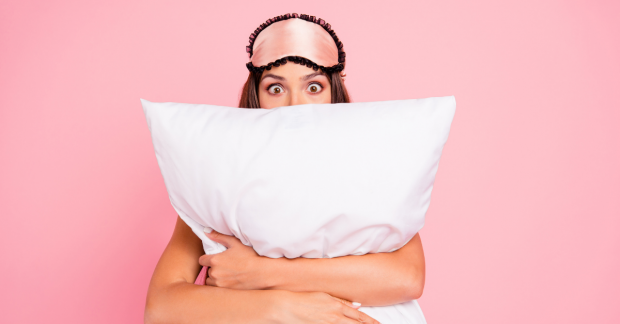If setting more than three alarms is necessary to wake you up, then you may already be getting tired of dragging yourself out of bed every day, cranky and tired.
And if you scowl at morning people– because how chipper could a person really be? There is hope for you, non-morning person! At the very least, your morning can become much easier.

miracle morning
by Hal Elrod
⏱ 14 minutes reading time
🎧 Audio version available
Get On a Schedule
With everyday things getting in the way, your bedtime probably varies from day to day. However, if you want to get that perfect sleep– waking up refreshed to the point that you don’t even need an alarm, you need to get on a schedule.
That means shutting off the lights and going to bed at the same time every night, as well as waking up at the same time every morning. Think of it as training yourself to wake up comfortably.
First things first, you need to figure out how many hours of sleep you need in order to wake up feeling refreshed. The recommended amount is seven to nine hours per night. How can you tell the perfect amount for you? Here are some signs you’re not getting enough hours of sleep.
You could experience fatigue throughout the day, “brain fog,” sleepiness, excessive yawning, irritability, and a lack of motivation. An increase in appetite is also a sign.
Even on off-days and weekends, stick to your sleep schedule. Soon enough, your body will get used to the routine and begin waking up on its own.
The Dos and Don’ts of Bedtime Routines
A sleeping schedule is preceded by a bedtime routine. Without even knowing it, you could be setting yourself up for failure. The dos and don’ts of a healthy, reinvigorating routine include the following:
In the later part of the day, around six hours before you hit the hay, completely cut off all caffeinated drinks.
If part of your routine is settling in bed and scrolling through social media, you may also be sabotaging your chances for good sleep. Any devices that emit blue light can easily prevent you from falling asleep. Looking at any type of screen, like your phone or laptop, interferes with your circadian rhythm, which is the internal process that regulates your sleep-wake cycle.
Get the Alarm Right
If you make time in order to hit snooze every day on your alarm, then maybe you’re not entirely to blame. There are several factors that go into getting your alarm right.
The first one is choosing an alarm that makes waking up easier. In theory, being gently nudged awake by the sound of rainfall, crashing waves, or a guitar softly strumming sounds charming, but do any of those really make you want to get out of bed or do they just lull you back to sleep? And if you think about choosing your favorite song as a wake-up call, then chances are that it’s not going to be your favorite song for much longer.
If you do have a song as your alarm, you may be on the right track! A study by RMIT University in Melbourne found that harsh alarms, especially ones that make you jolt awake, lead to increased levels of grogginess and stress, as well as less productivity throughout the day. Instead, what you want is a pleasant song that will help you transition more easily and steadily into a waking state.
What’s important is to choose a melodic sound that doesn’t surprise you in the morning.
Make Getting to Your Alarm Harder
There’s actually a word for hitting the snooze button several times. It’s called drockling. If your routine involves blindly hitting the snooze button, your drockling does more harm than good and provides less relief than you realize. Here is how you can avoid this.
Make getting to your alarm a more difficult process. Waking up to hit snooze then going back to sleep messes up your internal clock. By the time you finally drag yourself out from under the covers, you’re crankier and groggier than ever.
Avoid this problem entirely by placing your alarm far away from you. Far enough that you have to get up to shut it off, but not so far that you can’t hear it.
Leave Your Phone
In the first few minutes you’re awake, you’re still setting the tone for how groggy you’re going to be throughout the day. As you’re still in bed, you can control your upcoming energy levels. Reaching for your phone first thing in the morning is a sure way to start your day off badly.
If anything, it’s going to suck up a large amount of time you can use productively for something else.
Make Your Bed
There is a reason why your parents made you tidy up your bed every morning. This activity of simply straightening up your covers in a few minutes simultaneously eases your wake-up process and helps you sleep easier at night.
Not only does it give you a sense of accomplishment, but also when you crawl into bed at the end of a long day, it will be to a nicely made bed.
Stretch
- There are few things in the world as refreshing as stretching all your muscles in the morning.
- There are scientifically proven benefits to stretching.
See, the act of stretching in the morning gets the blood flowing into your muscles, especially if you usually sleep in the same position all night. Stretching also increases your flexibility and range of motion, as well as increases your endurance and decreases risk of injury.
Splash On Some Cold Water
Indulge your dreams of being in a skincare product commercial and splash some cold water on your face in the morning. That will drive away any leftover sleepiness.
Drink Water
Drinking a cup of coffee or tea may be at the top on your list of priorities in the morning, but take a moment and down a glass of water first. By doing so, you’re rehydrating your body, limiting fatigue, and decreasing your chances of becoming dehydrated.
Some people like starting their day with a glass of cold water while others drink warm water with lemon in order to shake off night time dehydration. Find what works best for you.
Eat Healthier
How you eat throughout the day sets the tone for the quality of your sleep and how difficult it will be to wake up later. A healthy diet does wonders towards increasing your energy.
On the opposite end of the spectrum, unhealthy foods– as tasty as they are– drain your energy and you’ll end up sluggish and suffering from indigestion. Stimulants, like caffeine, make it hard to adjust your sleeping schedule and fall asleep early, so it’s best to either avoid them or only indulge in the mornings.
However, a healthy diet full of nourishing foods like whole grains, fruits, vegetables, and foods that are high in omega-3 fatty acids, is a life-changer.
Tire Yourself Out
AKA: get regular exercise. If you find yourself too wired to fall asleep, exercise may be the key to falling asleep the moment your head hits the pillow.
Numerous studies have shown that exercise helps with conditions that cause insomnia, anxiety, and depression. Although it may not feel like it at first, exercise reduces fatigue and increases your energy levels.
Make Your Mornings As Stress-Free As Possible
You’ve done everything right, but you’re as wide-eyed as you can be instead of falling asleep. It may be because you’re stressing about the upcoming day. This stress, even when you eventually fall asleep, decreases the quality of your sleep.
The key to getting a perfect sleep and stressing a minimal amount about the next day is to prep for your day the night before.
If the thought of the million and one things you need to do when you wake up makes you want to hide under the covers, consider putting together your schedule ahead of time and making a to-do list.
In addition, set out your outfit the night before instead of struggling with decision-making in the morning.
Also set out options for a healthy breakfast before you go to sleep. Or if that’s not an option, at least decide what you want to have. Look for any way you can make your mornings easier so that you don’t dread them 12 hours beforehand.
And there you have it! It may not be smooth sailing right away. There are going to be times when you hit the snooze button or can’t fall asleep, but sticking to a schedule and finding what works best for you has incredible results.
What Is Snapreads?

With the Snapreads app, you get the key insights from the best nonfiction books in minutes, not hours or days. Our experts transform these books into quick, memorable, easy-to-understand insights you can read when you have the time or listen to them on the go.



